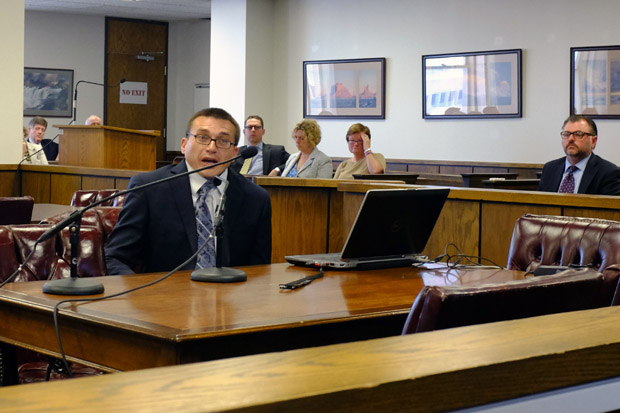
Austin Holland with the Oklahoma Geological Survey briefs Corporation Commissioners on new earthquake research.
Joe Wertz / StateImpact Oklahoma


Austin Holland with the Oklahoma Geological Survey briefs Corporation Commissioners on new earthquake research.
Joe Wertz / StateImpact Oklahoma

Joe Wertz / StateImpact Oklahoma
Austin Holland with the Oklahoma Geological Survey briefs Corporation Commissioners on new earthquake research.
Despite long-held suspicions that the state’s earthquake surge was linked to oil and gas activity, the Oklahoma Geological Survey stayed silent amid pressure from oil company executives, EnergyWire reports.
For this and other interviews, State Seismologist Austin Holland acknowledges “intense personal interest” from energy company executives, but told reporter Mike Soraghan it never affected his scientific findings:
But Holland and OGS have been the voice of skepticism in the scientific community about connections between oil production activities and the hundreds of earthquakes that have shaken the state.
The EnergyWire piece relies heavily on emails — click here to read a .pdf — obtained through the state Open Records Act, which highlight tensions with the oil industry, politicians and university donors, and reveal inconsistencies in OGS’s private discussions and public messaging.
Some of the highlights — paraphrased and bulleted by me, unless quoted directly:
In an email, Holland told the USGS that since 2010 the OGS had suspected an earthquake swarm near Jones was likely linked to an oil and gas operation known as the “Hunton dewatering.” Publicly, however, Holland downplayed the connection, Soraghan reports:
In a television interview at the time, he pointed toward natural causes. In a scientific posting, he pointed at changing water levels at a nearby lake.
That concerned [USGS’ Bill] Leith, who runs the earthquake hazards program at USGS. He wrote to Holland saying the lake level theory was “unlikely” and possibly unhelpful.
Asked by EnergyWire why he hadn’t publicly aired suspicions that Jones swarm was caused by oil production activities, Holland replied, “I guess you should go back and read my paper.” He sent a citation to a paper he published in 2013, which does not make a link between the Jones swarm earthquakes and the Hunton dewatering.
In October 2013, OGS joined the U.S. Geological Survey in issuing a statement about Oklahoma’s growing earthquake risk and possible links to oil and gas industry disposal wells. A week later, Holland was “summoned” to the Oklahoma Corporation Commission for a meeting with Jack Stark — then a senior vice president of exploration, now president and chief operating officer at Continental Resources — and then-Commissioner Patrice Douglas, Sorgahan reports:
Douglas and the Continental executive were “concerned” about the joint statement with USGS and a story about it by EnergyWire, Holland recounted later in an email.
At the time, Douglas was about to run for Congress. She got more campaign money from Continental executives in 2014 than anyone except Sen. James Lankford (R-Okla.) and the Republican National Committee, according to OpenSecrets.org. The $14,775 she received from Continental includes $6,575 from Hamm, who did not contribute to her Republican primary opponent, Steve Russell. Russell beat Douglas in the primary and is now a congressman.
In the meeting, Douglas said she “wants to, of course, protect the safety of Oklahomans, but also balance that with industry in the state,” according to Holland’s email.
After the OGS “cautiously” agreed with scientists about links between disposal wells and earthquakes, Holland in November 2013 was called into a meeting with University of Oklahoma President David Boren and oil executives, including Continental Resources Chairman Harold Hamm, “a leading donor to the university.” Boren also serves on Continental’s board of directors, where, in 2013, “he received $272,700 in cash and stock for his service,” Sorgahan reports:
A meeting with such powerful figures in the state would be intimidating for a state employee such as Holland, said state Rep. Jason Murphey of Guthrie.
“Wow. That’s a lot of pressure,” said Murphey, a Republican whose district has been rattled by numerous quakes. “That just sends chills up your spine if you’re from Oklahoma.”
In April 2013, another OGS scientist, petroleum geologist Richard Andrews, said in a note to a family member on his agency email account that OGS shouldn’t be telling the public that the earthquakes are naturally occurring.
“Myself and a few other geologists that know of the Hunton dewatering oil operations in the affected areas and subsequent re-injection into the Arbuckle [are] the culprit,” wrote Andrews, who is now the interim director of OGS. “I am dismayed at our seismic people about this issue and believe they couldn’t track a bunny through fresh snow!”